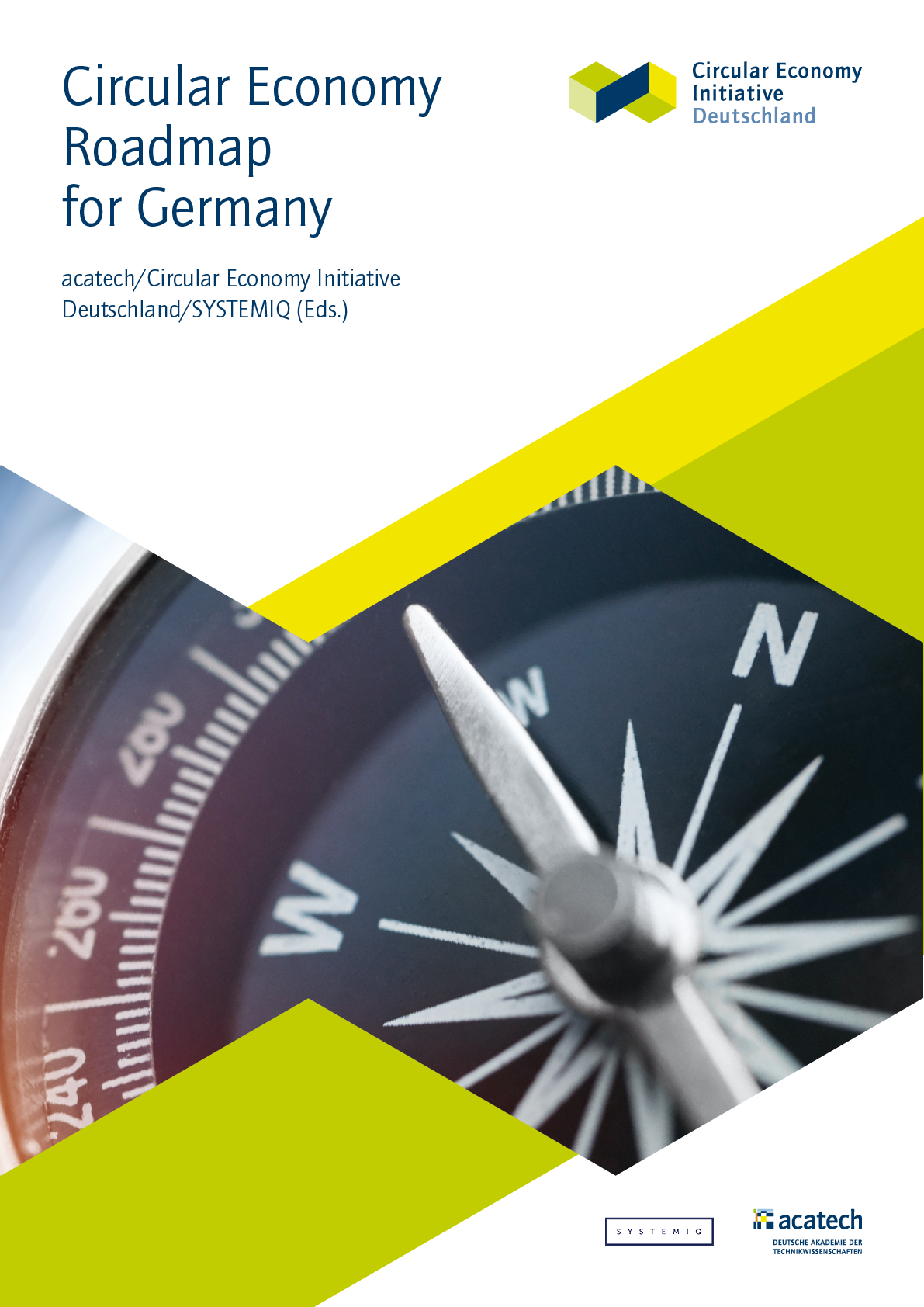Circular Economy Roadmap for Germany
Project: Circular Economy Initiative Deutschland
Published: 11 May 2021
Author / Publisher: acatech, Circular Economy Initiative Deutschland, SYSTEMIQ
Further Downloads:
We are going through a period of comprehensive dynamics: a time characterised by the rapid development of new technologies, new patterns in consumer behaviour, the linking of previously separate value chains to form new solutions, an enthusiasm for new business models fuelled by the capital markets, and last but not least a state that is framing and investing more strongly.
At the same time, the current prevalent production and consumption logic of “take, make, waste” – also referred to in German as the “throwaway society” – is increasingly reaching its planetary limits. The economic transformation is particularly urgent at the moment against the backdrop of exponentially worsening, multiple crises.
In this context, the Circular Economy offers Germany an overarching narrative that can unite economic and environmental policy in response to this new dynamic and thus contribute significantly to achieving the goals of the European Green Deal (especially climate neutrality 2050). Because the Circular Economy can address the related systemic crises of climate, resource use, biodiversity and global health at the same time if it is implemented consistently and in good time in the sense of a holistic systemic solution. Thus, the successful implementation of a Circular Economy is not an end in itself, but combines climate and resource protection with cultural change, increased competitiveness and independence from raw materials, as well as the creation of employment and local value creation in the sense of sustainable win-win solutions.
Based on the overarching narrative of uniting ecological, economic and social perspectives, the Circular Economy Initiative Deutschland (CEID) has defined a target vision.
“A systemically thought and sustainable Circular Economy comprehensively contributes to the EU target of net zero greenhouse gas emissions by 2050 and enables an absolute decoupling of economic growth from resource consumption. It ensures compliance with planetary boundaries and sustainability goals and contributes to enhancing quality of life and securing equitable prosperity through collaborative, cross-business value creation and innovation.”
The Circular Economy Initiative Deutschland, as a multi-stakeholder initiative involving over fifty institutions from science, industry and civil society, has created the foundation for this target vision. In interdisciplinary and cross-sectoral working groups, around 130 experts discussed how circular economic systems can be enabled and implemented.
To this end, they examined possible fields of application and discussed which framework conditions could lead to successful implementation. The Circular Economy Initiative Deutschland defined goals for this change process and focused on the following topics:
Circular business models and digital technologies as drivers for innovation
New value networks for batteries and packaging
Framework conditions for a circular transformation and assessment of the ecologic and economic potentials of a Circular Economy
The “Circular Economy Roadmap for Germany” synthesises the findings from the various CEID working groups and summarises them in a consolidated statement with a claim to shape society as a whole. It forms the central report of the Circular Economy Initiative Deutschland, which was founded in 2019 with funding from the Federal Ministry of Education and Research (BMBF), developed and supported by a large number of social actors from science, industry and civil society, the focus of this roadmap has thus been, from the very beginning, on shaping a consistent, common target vision for a Circular Economy in 2030 and formulating concrete recommendations for action.
The “Circular Economy Roadmap for Germany” is a scientifically based framework for action that systemically describes the necessary steps for Germany’s transition to a Circular Economy. It contains recommendations for action that are intended to provide orientation for decision-makers from politics, industry and science.



